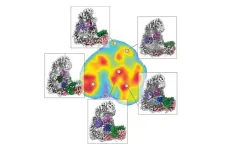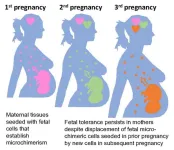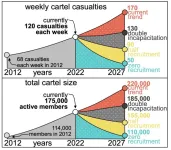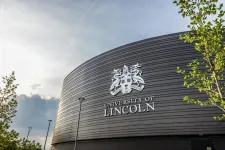(Press-News.org) Many of the nation’s most prominent cardiovascular organizations, representing tens of thousands of physicians, unite today to pursue the creation of a new Board for cardiovascular medicine. The proposed new Board would be independent of the American Board of Internal Medicine, where the cardiology certification process currently exists. Collectively, the American College of Cardiology (ACC), Heart Failure Society of America (HFSA), Heart Rhythm Society (HRS) and Society for Cardiovascular Angiography & Interventions (SCAI) are working together to submit a new Board application, with potential for additional consortium members to join.
Other cardiovascular organizations, including the American Heart Association (AHA), have applauded the vision and have collaborated in the development of the application. Formal support from AHA is pending, dependent on official review and consideration by AHA’s Board of Directors at its next scheduled meeting.
“It’s time to have a dedicated cardiovascular medicine Board of our own; cardiology is a distinct medical specialty and physicians want—and deserve—a clinical competency and continuous certification program that is meaningful to their practice and patients,” said ACC President B. Hadley Wilson, MD, FACC. “We know that the cardiovascular community is ready for an independent, self-governed entity, and we are proud to develop this new Board with cardiologists and cardiology organizations at the helm.”
Together, the consortium will submit an application to the American Board of Medical Specialties (ABMS), requesting an independent medical Board for cardiovascular medicine to pursue a new competency-based approach to continuous certification—one that harnesses the knowledge, skills and attitudes required to sustain professional excellence and care for cardiovascular patients effectively. ABMS remains the only authority widely recognized by the public, regulators and payers for initial and ongoing physician certification in the U.S. The new Board will replace the “Maintenance of Certification” approach with a pathway to continuous certification and competency, offering diplomates convenience, support, choice and credit for the learning that physicians currently do to keep their knowledge and skills at the highest level.
“The priority of this proposed new Board is to ensure the requirements truly benefit the cardiology community and the patients we serve,” said HFSA President John Teerlink, MD, FHFSA. “The new Board’s focus on competence in the pursuit of continuous certification is a needed paradigm shift for the field, and we look forward to future collaborations with the consortium as we submit the application.”
The field of cardiology has evolved into a complex specialty distinct from internal medicine, and sustaining relevant continuous certification and competency assessments is fundamental to providing high-value health care. The new Board requirements will de-emphasize timed, high stakes performance exams in the continuous certification process and instead will focus on learning assessments to identify gaps in current knowledge or skills, with recommendations offered on Continuing Medical Education (CME) learning resources and activities to help close the gaps. Importantly, the new Board will be developed and overseen by physicians dedicated to the field of cardiovascular medicine. Transparency into Board operations will be a key priority.
“SCAI is excited to collaborate with the other cardiovascular societies to bring forth the appropriate standards and transparency necessary for cardiovascular medicine certification requirements,” said SCAI President George Dangas, MD, PhD, MSCAI. “As the premier society representing interventional cardiology, we are committed to ensuring that we create a simplified process that speaks to the evolving trends in continuing education and other rising demands of physicians in our current health care landscape.”
The application approval process is expected to take several months. If approval is granted by ABMS, it will then take several additional months before initial certification and continuous certification and competency programs would begin.
“The field of cardiology, and the subspecialty of cardiac electrophysiology, have evolved dramatically over the last several decades,” said HRS President Jodie L. Hurwitz, MD, FHRS. “The time is now to create a Board of cardiovascular medicine that can offer our U.S. physician members an innovative approach to maintaining specialized certification that measures the true clinical competence of our diplomates and physicians with relevant educational support.”
For more information, please visit: https://www.cvboard.org.
About The American College of Cardiology
The American College of Cardiology (ACC) is the global leader in transforming cardiovascular care and improving heart health for all. As the preeminent source of professional medical education for the entire cardiovascular care team since 1949, ACC credentials cardiovascular professionals in over 140 countries who meet stringent qualifications and leads in the formation of health policy, standards and guidelines. Through its world-renowned family of JACC Journals, NCDR registries, ACC Accreditation Services, global network of Member Sections, CardioSmart patient resources and more, the College is committed to ensuring a world where science, knowledge and innovation optimize patient care and outcomes. Learn more at ACC.org or follow @ACCinTouch.
About the Heart Failure Society of America
The Heart Failure Society of America, Inc. (HFSA) represents the first organized effort by heart failure experts from the Americas to provide a forum for all those interested in heart function, heart failure, and congestive heart failure (CHF) research and patient care. The mission of HFSA is to provide a platform to improve and expand heart failure care through collaboration, education, innovation, research, and advocacy. HFSA members include physicians, scientists, nurses, nurse practitioners, pharmacists, trainees, other healthcare workers and patients. For more information, visit HFSA.org.
About the Heart Rhythm Society
The Heart Rhythm Society is the international leader in science, education, and advocacy for cardiac arrhythmia professionals and patients and the primary information resource on heart rhythm disorders. Its mission is to improve the care of patients by promoting research, education, and optimal healthcare policies and standards. Incorporated in 1979 and based in Washington, D.C., it has a membership of more than 8,200 heart rhythm professionals from 94 countries. For more information, visit HRSonline.org.
About the Society for Cardiovascular Angiography & Interventions
The Society for Cardiovascular Angiography & Interventions (SCAI) is a nonprofit professional association with nearly 4,500 members representing interventional cardiologists and cardiac catheterization teams in the United States. SCAI promotes excellence in interventional cardiovascular medicine for both adults and children through education, representation, and the advancement of quality standards to enhance patient care. Follow @SCAI on Twitter for the latest heart health news.
Media Contact
Nicole Napoli
202.375-6523
nnapoli@acc.org
END
Cardiovascular organizations pursue new, independent medical board
New Board would recognize evolution of cardiology into distinct medical specialty
2023-09-21
ELSE PRESS RELEASES FROM THIS DATE:
Skipping counseling doesn't raise cancer gene test distress
2023-09-21
Skipping genetic counseling before or after taking a remote screening of inherited risk for ovarian or breast cancer does not increase distress, anxiety or depression, according to a study published Sept. 14 in JAMA Oncology.
“The accepted idea was that you needed genetic counseling before taking a genetic test,” said Dr. Elizabeth Swisher, a gynecologic oncologist at UW Medicine and professor of obstetrics and gynecology at the University of Washington School of Medicine. “But we’re finding out that many of these protocols actually represent ...
Nanoparticle vaccine candidate shows promise against emerging tick-borne virus in early studies
2023-09-21
Cleveland Clinic researchers have used nanoparticles to develop a potential vaccine candidate against Dabie Bandavirus, formerly known as Severe Fever with Thrombocytopenia Syndrome Virus (SFTSV), a tick-borne virus that currently has no prevention, treatment or cure.
The patent-pending vaccine uses nanoparticles to carry the antigens that contain instructions for fighting off a virus. Nanoparticle vaccines are designed to effectively deliver antigens at a lower dose with fewer side effects for at-risk ...
University of Minnesota Medical School assistant professor, research team awarded $1 million grant to improve access to legal advocacy for rural and Indigenous communities
2023-09-21
MINNEAPOLIS/ST. PAUL (09/21/2023) — Michele Statz, PhD, an assistant professor at the University of Minnesota Medical School, Duluth Campus and affiliated faculty with the University of Minnesota Law School’s Human Rights Center, and her research team have been awarded a $1 million grant from the National Science Foundation’s CIVIC Innovation Challenge to improve access to civil justice for rural and Indigenous communities in Alaska. The research team aims to develop a model that can be replicated in other communities across the country.
The “Bridging the Rural Justice Gap: Innovating & Scaling Up Civil Access to Justice in Alaska” ...
Scientists reveal intricate mechanisms cells use to build protein destruction signals
2023-09-21
Within the intricate molecular landscape inside of a cell, the orchestration of proteins demands precise control to avoid disease. While some proteins must be synthesised at specific times, others require timely breakdown and recycling. Protein degradation is a fundamental process that influences cellular activities such as the cell cycle, cell death, or immune response. At the core of this process lies the proteasome, a recycling hub in the cell. The proteasome degrades proteins if they carry a molecular tag formed by a chain of ubiquitin molecules. The task of attaching this tag falls to enzymes known as ubiquitin ligases.
This process, known ...
Moms’ ability to ‘remember’ prior pregnancies suggests new strategies for preventing complications
2023-09-21
Scientists have known for decades that pregnancy requires a mother’s body to adjust so that her immune system does not attack the growing fetus as if it were a hostile foreign invader. Yet despite learning a great deal more about the immunology of pregnancy in recent years, a new study shows that the cellular crosstalk between a mother and her offspring is even more complex and long-lasting than expected.
The study was published online Sept. 21, 2023, in the journal Science by a research team led by Sing Sing Way, MD, PhD, Division of Infectious Diseases at Cincinnati Children’s and the Center ...
Curbing violence in Mexico: Disrupting cartel recruitment holds the key, a new study finds
2023-09-21
Not through courts and not through prisons. The only way to reduce violence in Mexico is to cut off recruitment. Increasing incapacitation instead leads to both more homicides and cartel members, researcher Rafael Prieto-Curiel from the Complexity Science Hub and colleagues show in a study in Science.
In 2021, approximately 34,000 people died from intentional homicides in Mexico – the equivalent of nearly 27 victims per 100,000 population. This ranks Mexico among the least peaceful countries worldwide.
FIFTH LARGEST EMPLOYER
In order to be able to address this violence ...
Rewiring tumor mitochondria enhances the immune system’s ability to recognize and fight cancer
2023-09-21
Immunotherapy, which uses the body’s own immune system to fight cancer, is an effective treatment option, yet many patients do not respond to it. Thus, cancer researchers are seeking new ways to optimize immunotherapy so that it is more effective for more people. Now, Salk Institute scientists have found that manipulating an early step in energy production in mitochondria—the cell’s powerhouses—reduces melanoma tumor growth and enhances the immune response in mice.
The study, published in Science on September 21, ...
Two studies indicate CO2 on Europa’s surface originated from within the moon’s internal ocean
2023-09-21
A pair of independent studies, using recent James Webb Space Telescope (JWST) observations of carbon dioxide (CO2) ice on Jupiter’s moon Europa, indicate the CO2 originates from a source within the icy body’s subsurface ocean. The findings from both research groups provide new insights into the poorly known composition of Europa’s internal ocean. Beneath a crust of solid water ice, Jupiter’s moon Europa is thought to have a subsurface ocean of salty liquid water. Because of this, Europa is a prime target in the search for life elsewhere in the Solar System. Assessing this deep ...
Global study reveals extensive impact of metal mining contamination on rivers and floodplains, suggesting need for new safeguards to address spike in demand for ‘green’ minerals
2023-09-21
A groundbreaking study, published today in Science, has provided new insights into the extensive impact of metal mining contamination on rivers and floodplains across the world, with an estimated 23 million people believed to be affected by potentially dangerous concentrations of toxic waste.
Led by Professors Mark Macklin and Chris Thomas, Directors of the Lincoln Centre for Water and Planetary Health at the University of Lincoln, UK – working with Dr Amogh Mudbhatkal from the University’s Department of Geography – the study offers a comprehensive understanding of the environmental and health challenges associated with metal mining activities.
Using ...
Regeneration across complete spinal cord injuries reverses paralysis
2023-09-21
When the spinal cords of mice and humans are partially damaged, the initial paralysis is followed by the extensive, spontaneous recovery of motor function. However, after a complete spinal cord injury, this natural repair of the spinal cord doesn’t occur and there is no recovery. Meaningful recovery after severe injuries requires strategies that promote the regeneration of nerve fibers, but the requisite conditions for these strategies to successfully restore motor function have remained elusive.
“Five years ago, we demonstrated that nerve fibers can be regenerated across anatomically complete spinal cord ...
LAST 30 PRESS RELEASES:
Scientists show how to predict world’s deadly scorpion hotspots
ASU researchers to lead AAAS panel on water insecurity in the United States
ASU professor Anne Stone to present at AAAS Conference in Phoenix on ancient origins of modern disease
Proposals for exploring viruses and skin as the next experimental quantum frontiers share US$30,000 science award
ASU researchers showcase scalable tech solutions for older adults living alone with cognitive decline at AAAS 2026
Scientists identify smooth regional trends in fruit fly survival strategies
Antipathy toward snakes? Your parents likely talked you into that at an early age
Sylvester Cancer Tip Sheet for Feb. 2026
Online exposure to medical misinformation concentrated among older adults
Telehealth improves access to genetic services for adult survivors of childhood cancers
Outdated mortality benchmarks risk missing early signs of famine and delay recognizing mass starvation
Newly discovered bacterium converts carbon dioxide into chemicals using electricity
Flipping and reversing mini-proteins could improve disease treatment
Scientists reveal major hidden source of atmospheric nitrogen pollution in fragile lake basin
Biochar emerges as a powerful tool for soil carbon neutrality and climate mitigation
Tiny cell messengers show big promise for safer protein and gene delivery
AMS releases statement regarding the decision to rescind EPA’s 2009 Endangerment Finding
Parents’ alcohol and drug use influences their children’s consumption, research shows
Modular assembly of chiral nitrogen-bridged rings achieved by palladium-catalyzed diastereoselective and enantioselective cascade cyclization reactions
Promoting civic engagement
AMS Science Preview: Hurricane slowdown, school snow days
Deforestation in the Amazon raises the surface temperature by 3 °C during the dry season
Model more accurately maps the impact of frost on corn crops
How did humans develop sharp vision? Lab-grown retinas show likely answer
Sour grapes? Taste, experience of sour foods depends on individual consumer
At AAAS, professor Krystal Tsosie argues the future of science must be Indigenous-led
From the lab to the living room: Decoding Parkinson’s patients movements in the real world
Research advances in porous materials, as highlighted in the 2025 Nobel Prize in Chemistry
Sally C. Morton, executive vice president of ASU Knowledge Enterprise, presents a bold and practical framework for moving research from discovery to real-world impact
Biochemical parameters in patients with diabetic nephropathy versus individuals with diabetes alone, non-diabetic nephropathy, and healthy controls
[Press-News.org] Cardiovascular organizations pursue new, independent medical boardNew Board would recognize evolution of cardiology into distinct medical specialty





